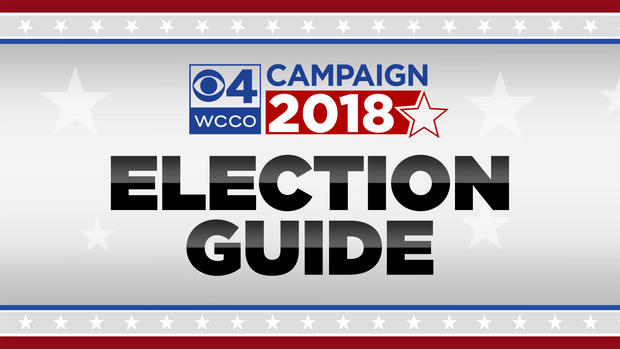Jeff Johnson: 2018 Election Guide
Welcome to WCCO.com's 2018 political guide!
We reached out to all Minnesota candidates running for U.S Senate, Governor, U.S Congress, Attorney General, Secretary of State and State Auditor this fall. Candidates were asked to provide a two-minute video discussing their platform as well as answer a set of our viewer's questions.
Above is the video and below are the answers Jeff Johnson provided. This is not a paid advertisement nor does WCCO endorse any candidate.
Responses from Jeff Johnson, Republican candidate for Governor:
The Trump Administration's new E.P.A rollback of Coal Pollution Regulations allows states to decide how much to cut emissions. What is your stance on the Clean Air Act and what policy would you propose if elected?
Minnesota's carbon emissions have been steadily falling due to changes in the marketplace. As coal has been replaced by natural gas generation, Minnesotans have benefited from cleaner air and reliable electrical generation. I think this is a good trend.
Should people convicted of non-violent drug offenses be released from prison and their records expunged?
Very few Minnesotans have been sentenced to prison solely for nonviolent drug possession. I don't believe that people dealing drugs, whose profits often fund other criminal activities, should be released from prison. In the meantime, Minnesota should continue its policies of diverting nonviolent consumers to drug courts and offering alternatives to incarceration.
Should Minnesota legalize and regulate sports gambling?
I'm open to legalizing sports betting in Minnesota as long as there are reasonable limits placed on the size of the bets.
What is the most important priority investment you will make in Minnesota government if you are elected (e.g. education, transportation, health care)?
Minnesotans have always put education at the top of our priority list because it really is an investment in our future. Education is one of the few spending priorities listed in the Minnesota constitution and it will be a priority for me. That will come, however, with more accountability and a simplification of the funding formula.
I want to expand educational choices for students and parents because some students are being left behind. Closing the achievement gap is one of the best investments we can make.
What are your views (if any) about the divide between rural/urban Minnesota; if so, what would you do to address urban/rural concerns (e.g. infrastructure, internet access, economic development)?
Governor Dayton has neglected Greater Minnesota in favor of some of his pet projects in the Twin Cities. The worst examples stem not from his spending priorities, but from what some in rural Minnesota have called a tsunami of regulations. Time and again his agencies have stymied economic growth by imposing burdensome regulations on our farmers and smaller cities. The first thing the next governor needs to do is start listening again and begin removing barriers to success. Greater Minnesota has some of the smartest and most resourceful people in the state, and it's time to stop holding them back.
Should Minnesota pass a law to require criminal background checks for every gun purchase or transaction in the states?
The National Instant Criminal Background Check is already required for all gun purchases from licensed firearm dealers, and the system works well. If by "every gun purchase and transaction" you mean to include giving gifts, trades between collectors, and similar transactions, then I oppose such legislation.
Do you believe recreational marijuana should be legalized in Minnesota?
While I have always supported medical marijuana, I oppose legalization of marijuana for recreational use.
Should Minnesota raise the minimum wage to $15 statewide?
The best way to raise the minimum wage is to keep the economy growing. In good times, the minimum wage employers can pay goes up as the labor market gets tight. In recessions, high minimum wages lead to people losing jobs. As we've seen from other places, raising the minimum wage to $15 actually hurts those we claim to want to help - the least educated and experienced among us.
Should Minnesota grant a permit for Enbridge Energy Company to build a new oil pipeline across central Minnesota, and approve a new route for the updated pipeline?
The process for approving the Enbridge pipeline has been a disgrace. While I fully support the need for government oversight of large environmentally sensitive projects, the process should be transparent and the rules shouldn't be changed on the whim of policy makers. Instead of a transparent process, it's clear that the Dayton Administration has done everything it can to stop the project regardless of whether it is environmentally safe or not. I will be an advocate to finish this process and move forward with construction.
Will you abolish MNSure if you are elected?
People often mistake MNSure for the Affordable Care Act in general, which it is not. MNSure is Minnesota's program to implement the Affordable Care Act, and it duplicates functionality that the federal government already provides. MNSure costs Minnesota taxpayers $40 million or more a year, while providing inferior service to our citizens. I would close down MNSure and give Minnesotans access to the federal exchange.
Should Medicaid recipients be required to work?
Medicaid recipients are unique individuals, so there is no one-size-fits-all answer to this question. Medicaid recipients who can work, should. Many already do.
Work provides dignity. We should encourage every recipient to work as they are able.
The population of Minnesota is expected to grow by 800,000 by 2035. What would you do to accommodate rapid growth on the state's transportation system? Please outline a future funding mechanism for roads and bridges.
The State Demographer estimates that Minnesota's population will increase by half a million by 2035, putting a strain on our current transportation infrastructure. This is nothing new. Minnesota has been growing for decades, and it used to be that Republicans and Democrats agreed on how best to increase mobility and did what was necessary. Transportation policy shouldn't be the partisan minefield it has become. In recent years many Twin Cities liberals have adopted an anti-car ideology that downplays investments in increased mobility in favor of policies that squeeze people into very expensive rail transit. I believe our first responsibility is to fully fund the roads and bridges Minnesota's commuters and businesses need and a world-class bus system for those who use transit. We need to stop focusing our transportation investments on boutique projects in the Twin Cities.




